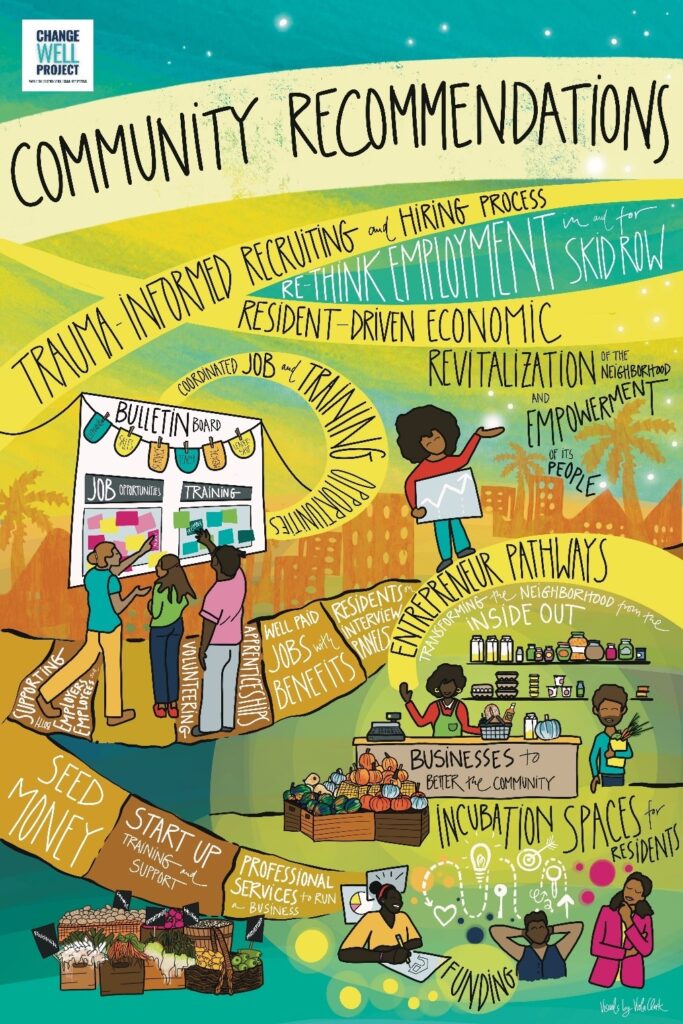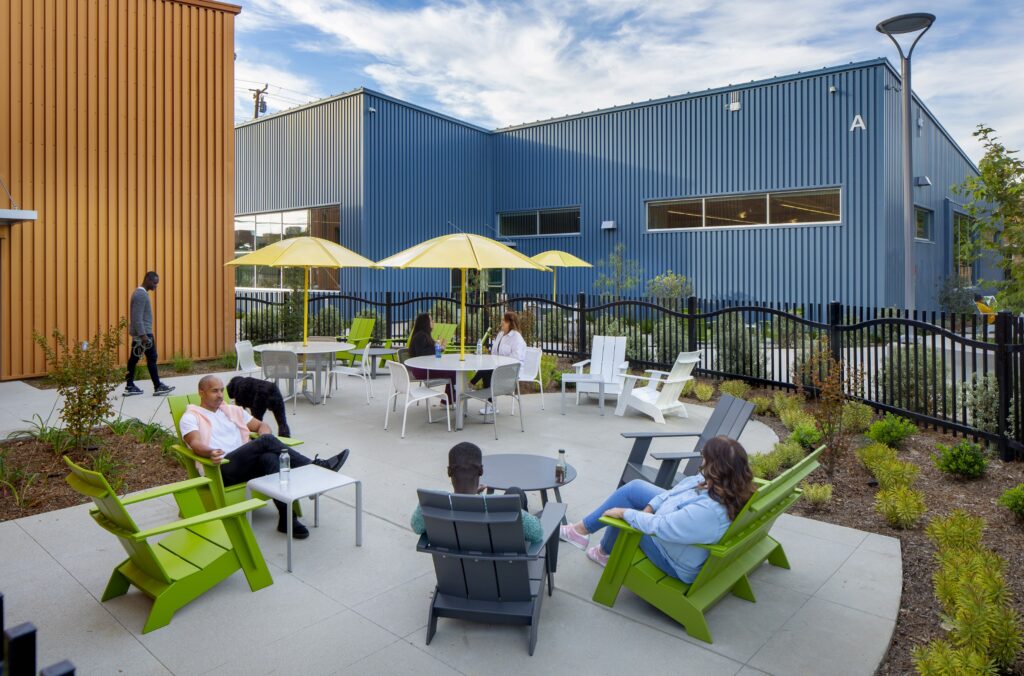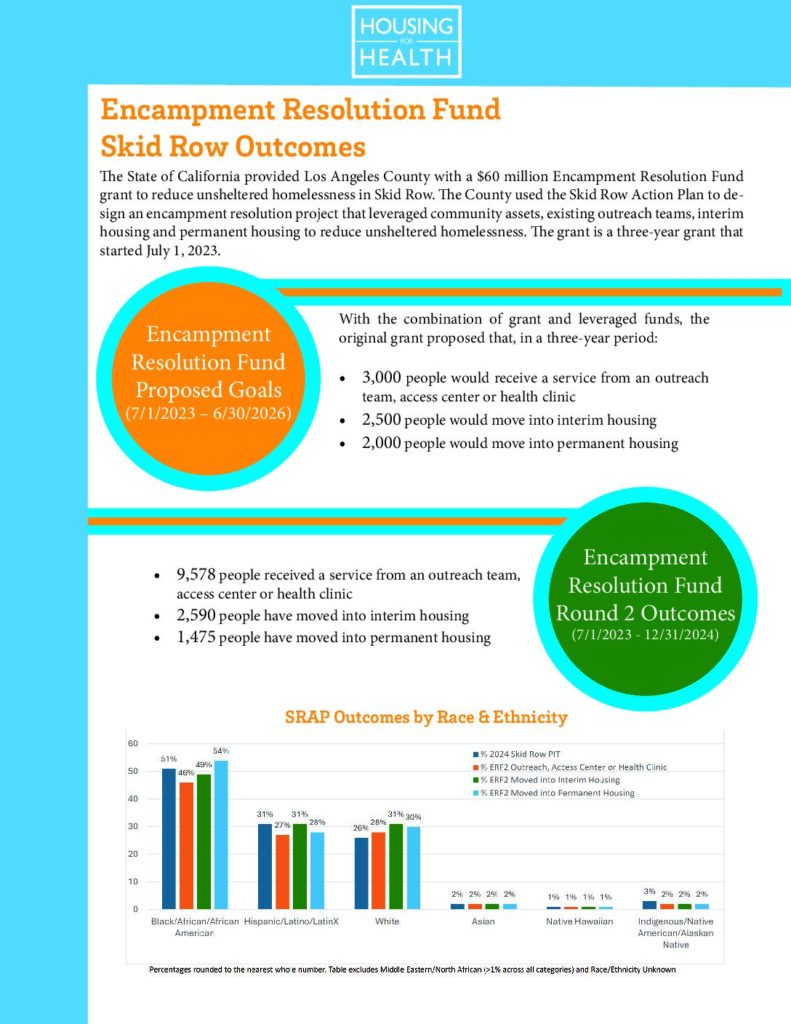Special Initiatives

Skid Row Action Plan Report Update:
Please see here for a Health Services update to the Board of Supervisors and for an implementation report by our partner, Change Well Project. The update shares information about new projects, including additional beds and a triage site. The report describes the community design process, recommendations and results.
Overview:
The Skid Row Action Plan (SRAP) is a roadmap that aims to dramatically expand housing and other homeless services downtown while supporting the development of a culturally vibrant and thriving Skid Row community. Specifically, the Plan sets priorities to support safety and wellness in Skid Row by expanding access to interim and permanent housing, health care, harm reduction, and other supportive services.
History:
According to the 2022 Greater Los Angeles Homeless Count, about 4,400 people are experiencing homelessness in the Skid Row neighborhood. Of those individuals, 2,695 are unsheltered. As the epicenter of homelessness in the nation, Skid Row also experiences the highest overdose mortality rate in LA County. Acknowledging the importance of creating a healthy and safer community in a neighborhood that has been shaped by decades of structural and systemic inequalities, the Los Angeles County Board of Supervisors passed a motion introduced by Supervisor Hilda Solis in June 2022 to create the Skid Row Action Plan.
In June 2023, Housing for Health and partners were awarded a $60 million state grant to provide housing and services to an estimated 2,500 individuals experiencing unsheltered homelessness on Skid Row. The funding served as a catalyst for the Skid Row Action Plan, a $280 million initiative developed in collaboration with community members, business owners and service providers.
Community Collaboration:
Throughout 2023, community members, community-based organizations and government agencies collaborated during several design sessions to create recommendations for the Skid Row Action Plan. The workgroup members presented their final recommendations in December 2023 during a celebratory event at the Los Angeles Mission. Now the projects are moving toward implementation, as Health Services works on securing funding.
Skid Row Projects:
- Increasing the availability of safe interim housing and opening more pathways from interim to permanent housing
- Increasing the availability of and access to safe permanent housing
- Creating a Safe Services Space that centralizes access to a wide range of care services and programs that support and empower vulnerable populations
- Creating a health and behavioral healthcare center that offers critical services for those in crisis and those seeking a low-barrier entrance into preventative and ongoing medical care
- Creating a Harm Reduction Health Hub that increases the safety and wellbeing of those who use drugs through holistic support

The Capital Improvement Intermediary Program (CIIP) manages the construction of facilities that expand housing and services for people experiencing homelessness. Housing for Health works closely with Brilliant Corners and project sponsors to design, build, convert, and renovate spaces that offer a supportive and dignified experience for clients.
Our housing is designed with the social and emotional needs of residents in mind and includes spaces for community gatherings and specialized services such as health screenings and intensive case management. Project types include historical renovations, motel conversions, repurposing buildings for new use and ground-up construction.
From January 1 to December 31, 2024:
- 80 units/beds completed during the reporting period
- 521 units/beds currently in the CIIP pipeline

The Homelessness Prevention Unit (HPU) is a proactive, data-driven program launched in July 2021 to identify clients at high risk of experiencing homelessness and to test strategies to prevent their homelessness. Clients are identified through predictive modeling by UCLA’s California Policy Lab. HPU staff work with clients over four to six months to help stabilize their housing and improve their overall health. The program also provides flexible financial assistance that can pay for rent, utility payments, vehicle repair, and debt resolution. Individuals and families are also linked to health and mental health services, substance use treatment, benefits advocacy, legal aid, employment assistance, and education.
From January 1 to December 31, 2024:
- 712 households served
- 90% of HPU clients retained housing or transitioned to other permanent housing at program exit
